~Learning about Social Innovation in the U.S.~
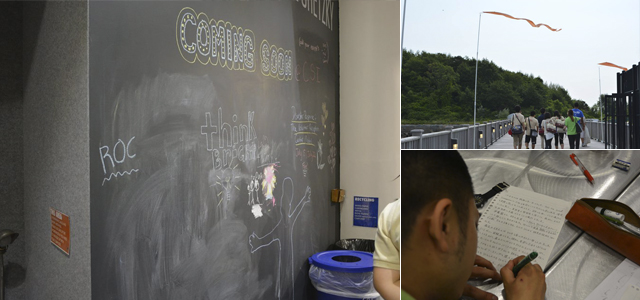
Overview
In the summer of 2014, BEYOND Tomorrow conducted the BEYOND Tomorrow Summer Global Program – Summer Program in the U.S.. For this program seven students from Tohoku, overcoming the adversities of the Great East Japan Earthquake and Tsunami and aspiring to become global leaders, were selected and sent to New York and Boston. The participants visited people and groups who are the driving force behind activities to improve society through creative concepts. It is hoped that, through their experience in the U.S., the students will form a clear vision of their activities as leaders who will themselves guide society toward reform, and will consider their future careers from a broader perspective.
Dates
July 12 (Sat) to July 13 (Sun) Orientation
August 1 (Fri) to August 10 (Sun) U.S. Program
Themes
The students deepened their understanding of innovative thinking and design thinking for the purpose of creating a better society. They learned examples that they could use in Japan and in Tohoku. The students experienced different cultures by interacting with local people and were also able to fulfill their role as Tohoku ambassadors by communicating about the Great East Japan Earthquake and Tsunami and the current state of Tohoku’s recovery.
Participants
Seven high school students and university students who were living in Iwate, Miyagi, or Fukushima prefectures at the time of the Great East Japan Earthquake and Tsunami and who, overcoming the adversities of the earthquake and tsunami, have the will to become active leaders in the world. Participants were selected through an application process.
 |
Hazuki Kamada
Yokohama Seiryo Sogo High School, Kanagawa Prefecture (Originally from Fukushima prefecture)
Hazuki’s house was washed away by the tsunami, and her grandfather went missing. Because of the nuclear power plant incident, the area around her home in the Minamisouma, Fukushima has become a restricted area, meaning that they had to evacuate without searching for him. Currently, they are still in Yokohama. Because of rumors about Fukushima’s safety, the area has suffered economically, and Hazuki would like to help counter this by communicating Fukushima’s beauty to people around the world. Through her stay in America in 2013, she came into contact with many people, and felt that her future possibilities expanded as a result. She now aspires to be become a kindergarten teacher. |
 |
Nanami Takahashi
St. George’s School in Switzerland, Year 12 (Originally from Miyagi prefecture)
Nanami went to study abroad in Switzerland through the BEYOND Tomorrow Study Abroad Program. After seeing her life fall apart in front of her own eyes, in her despair she felt as though she had lost the will to live at times, but now thinks that experiencing the disaster opened her eyes to something she had never noticed before. After the disaster, she traveled to Minsk in the Republic of Belarus as a representative of the disaster region, and taught people there, including the mayor and high school students about her experience. From here on, she would like to go beyond what the media communicates, and try to express her thankfulness for the support and encouragement she received at the time of the disaster. |
 |
Ryo Ninakawa
Koriyama High School, Fukushima Prefecture
Ryo’s home was partially destroyed during the disaster. His hometown of Fukushima has been shaken by the nuclear reactor incident, and he would like to convey to people around the world the anxiety that people in Fukushima still feel. Furthermore, he would like to understand the opinions and ideas people in America have about this problem to better understand what he can do. After travelling to the U.S. last year he is considering applying to study abroad overseas. In the future he hopes to work for the U.N. to try to make safe and reliable sources of energy available to people around the world. |
 |
Shuyu Takahashi
Ofunato High School, Iwate Prefecture
Shuyu’s home, and her family’s store and factory were completely destroyed by the tsunami. After that, her family reopened their business in a provisional shopping district. What she would like to communicate to the world is that although right after the disaster customers were flocking to the relocated store, the situation now is becoming direr – far fewer customers and imbalance between employers and job applicants, which are slowing down the recovery. During this program, she would like to listen to the ideas of world leaders in America, and gain a global perspective. |
 |
Yoshifumi Ono
Sendai First High School, Miyagi Prefecture
Ever since experiencing the disaster, Yoshifumi’s dream has been to communicate to the next generation and people around the world reduction of disaster risk and damage. To make this dream come true, he would like to travel and learn more about disasters in other parts of the world, and so is participating in this program. He also wants to communicate to the world the situation for young people like him who have become storytellers since the disaster. Finally, he wants to deliver a message to the world that reminds people, “Please don’t forget about the disaster.” |
 |
Noriko Yusa
Showa Women’s University, Department of Human Environmental Science and Design (Graduate of Miyako High School, Iwate Prefecture)
In the tsunami Noriko lost her home, and her grandmother, who was like a mother to her. She dreams of becoming a designer in the future and making products to improve people’s lives. Using her experiences from the disaster, she would like to make it possible to manufacture products designed to help people with physical disabilities move during a disaster. She wants to become a designer needed by people around the world, and so she has chosen design as her college major. Also, having personally experienced the disaster, she wants to change how people think about disasters, and believes it is her mission to communicate this to people around the world, including the younger generation. After continuing on to her university, she feels even greater pride for her native Tohoku. |
 |
Minori Endo
Ishinomaki Senshu University, School of Management (Graduate of Ishinomakikita High School, Miyagi Prefecture)
After losing her father and her home in the disaster, Minori was in the depths of despair. But motivated by the desire to raise awareness of the disaster to as many people as possible, she used her experience of being president of the photography club and widely distributed photographs of the aftermath of the tsunami and earthquake through media outlets. As a victim of the disaster, Minori wants to communicate to the world the “here and now” of the Tohoku region — she hopes to make an impression in people’s hearts of what it means to be living. She has also worked as a BEYOND Tomorrow intern since February 2014. Minori continues to support BEYOND Tomorrow from the background. |
 |
Masahide Chiba
Keio University, Policy Management Department (Graduate of Ofunato High School, Iwate Prefecture)
Masahide was in Ofunato at the time of the disaster. He lost his mother and grandmother during the tsunami, and their house was also swept away. From being the lone survivor among many who lost their lives, he believes it is his mission to contribute to the creation of towns that can much better withstand natural disasters. Because of encounters with various people and personal experiences, he has changed from an architecture-based approach to a person-centered one for the revitalization of Tohoku. In September of 2013 he entered his current university. In 2012 and 2013 he participated in the BEYOND Tomorrow Summer Global Education Program and went to America. He took part in an internship connecting to the activities in his home region, and moved forward towards realizing his dreams. |
Program
Pre-Orientation
Pre-orientation Schedule
Location: Kashiwagidaira Lake Resort
July 12 (Sat)
|
Program |
| Morning |
Meet up Orientation |
| Afternoon |
Lunch
Workshop (1) Self Introductions in English
Workshop (2) Presentation Preparation “What we want to tell the world about Tohoku today”
Workshop (3) Presentation Preparation “What we want to tell the world about Tohoku today” (In English)
Presentations |
| Evening |
Barbeque
BEYOND Tomorrow Night |
July 13 (Sun)
|
Program |
| Morning |
Breakfast Nature Walk
Discussion Session “The me I want to see in the fall”
Destination Orientation
Lessons learnt in Europe, from last year’s students |
| Afternoon |
Lunch
Workshop (4) Preparation of a team charter
Presentations
End of activities |
Before the program in the U.S., the students participated in a one-night, two-day pre-orientation. During the orientation, students considered again the significance of their visit to the U.S., as people from Tohoku, and the kinds of things they hoped to learn through the experience in the U.S., as well as what they, as Tohoku ambassadors, wanted to communicate to people in the U.S. The students formed groups through discussion, and at the end they gave presentations in English.
Program in the U.S.
U.S. Summer Program Schedule
| Date |
City |
Details |
| August 1 (Fri) |
|
Tokyo to New York
Arrive and go to accommodation
(Stay overnight in New York) |
| August 2 (Sat) |
NY |
Sightseeing in the city
(Stay overnight in New York) |
| August 3 (Sun) |
NY |
(Morning) Reflection
(Afternoon) Discussion with leaders (Keisuke Shirai, Gohei Nishikawa, and Yutaka Takiura)
(Evening) Presentation preparation
(Stay overnight in New York) |
| August 4 (Mon) |
NY |
(Morning) Visit to the 9/11 Tribute Center and Lunch
(Afternoon) Talks with a leader (Stomu Miyazaki)
Discussion session: Echoing Green
(Evening) Dinner party with New York Japanese American Association
(Stay overnight in New York) |
| August 5 (Tues) |
NY |
(Morning) Visit to The Center for Social Innovation NYC
(Afternoon) Visit to Ito En (North America)
(Evening) Dinner party hosted by Stephen Globus
(Stay overnight in New York) |
| August 6 (Wed) |
New York to Boston |
(Morning) Travelling from New York to Boston
(Afternoon) Harvard University campus tour and presentation for a class
(Evening) Dinner with students from Harvard University
(Stay overnight in Boston) |
| August 7 (Thurs) |
Boston |
(Morning) Cultural exchange with the Boys and Girls Club of Boston
(Afternoon) Presentation at The University of Massachusetts
(Evening) Explore Quincy Market on foot Dinner
(Stay overnight in Boston) |
| August 8 (Fri) |
Boston |
(During the day) Closing ceremony at Reischauer House (Hosted by The U.S.-Japan Council and The Japan Society of Boston)
(Early Evening) Explore the city on foot
(Evening) Reflection
(Stay overnight in Boston) |
| August 9 (Sat) |
|
Leave for Japan
(Spend the night in the plane) |
| August 10 (Sun) |
|
Arrive in Tokyo |
Creative Thinking and Innovation
Participants visited a variety of groups and individuals to learn the keys to how innovation contributes to society’s development in the U.S., which is the global center for innovation, as well as in what kinds of environments “social innovation” prospers. On the last day the students gave presentations on what they had learned for the leaders.
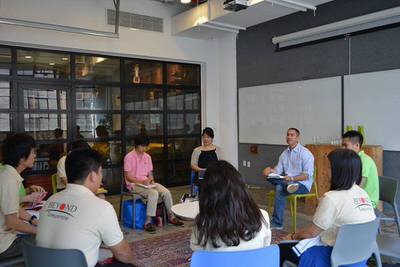
Visiting the Center for Social Innovation, which provides a co-working space for entrepreneurs.
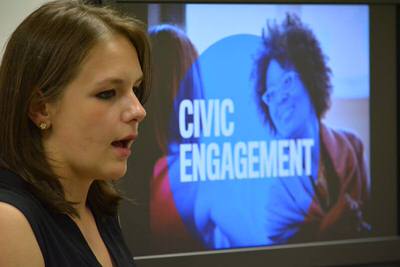
The session with Echoing Green, which provides support for starting new businesses through fellowship with young entrepreneurs.
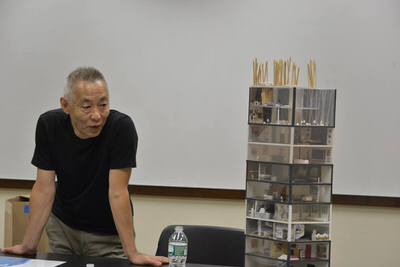
From architectural designer Stomu Miyazaki, students learned about how people chase their dreams, and how that leads to realization and maintained impact.
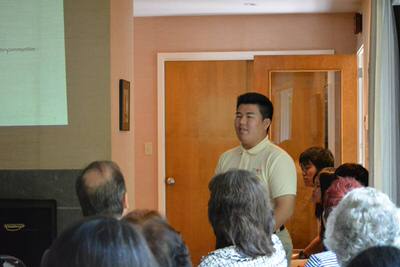
The U.S.-Japan Council and The Japan Society of Boston hosted a closing ceremony at Reischauer House. The students used performances and presentations to show what they had gained from the program to the leaders in U.S.-Japan relations in Boston.
Talking with Leaders
Students heard from Japanese leaders who are active globally, and especially in the U.S., about how interesting and challenging it can be to work on an international level, giving the participants an opportunity to consider an international career. Through interaction with local young people of similar ages to themselves, the students renewed their determination to strengthen the bonds between Japan and the U.S. as future leaders.
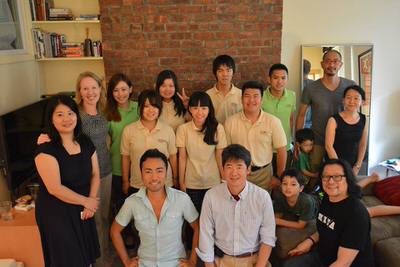
Discussion session with leaders active in New York.
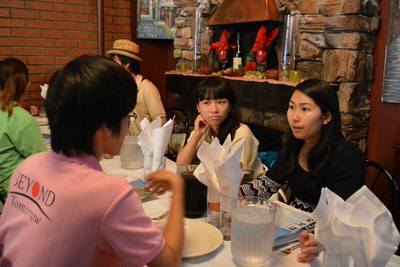
Mentor dinner with Japanese leaders living in New York.
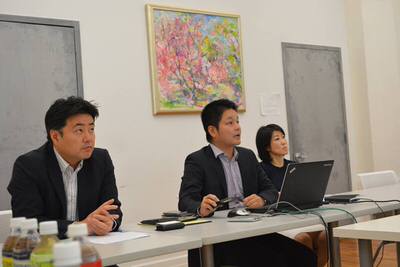
The students visited Ito En (North America) and had a discussion session with Ito En employees, who continue to work to promote the spread of Japanese culture in the world through business.
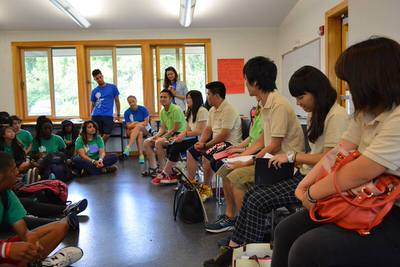
Cultural exchange with young people from the Boys and Girls Club of Boston. BEYOND Tomorrow has had exchanges with this club for three years, in Japan and in the U.S.
Communicating about Tohoku as it is now
Telling people in the U.S. about Tohoku as it is now, three years after the earthquake and tsunami.
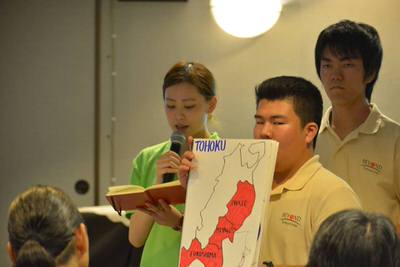
At the presentation by the Japanese American Association of New York the current situation in Tohoku was communicated to Japanese Americans who have Tohoku in their thoughts.
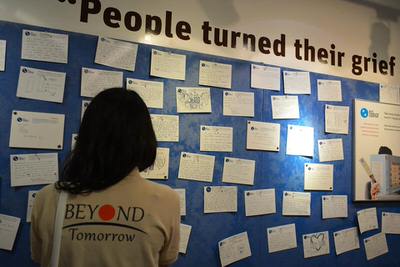
The students visited the 9/11 Tribute Center, interacting with family members who lost loved ones in the September 11 attacks, and discussing the significance of inheriting tragedy. BEYOND Tomorrow has continued its relationship with the center every year since 2012.
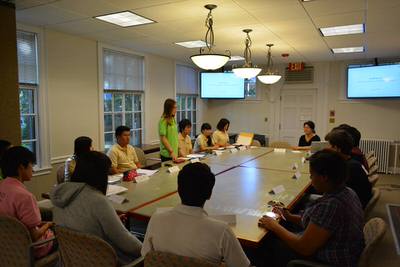
A presentation for a class of students studying Japanese at Harvard University.
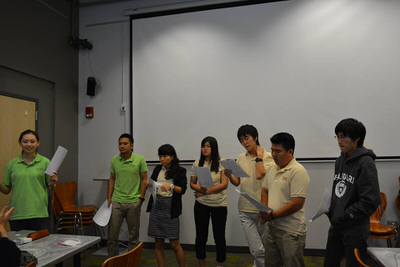
The students gave a presentation about Tohoku as it is today for students conducting research on East Asia at the The University of Massachusett, Bostons. The students asked questions about the Japanese mindset that they noticed through the Great East Japan Earthquake and Tsunami.
Supporters









 Visiting the Center for Social Innovation, which provides a co-working space for entrepreneurs.
Visiting the Center for Social Innovation, which provides a co-working space for entrepreneurs.
 The session with Echoing Green, which provides support for starting new businesses through fellowship with young entrepreneurs.
The session with Echoing Green, which provides support for starting new businesses through fellowship with young entrepreneurs.
 From architectural designer Stomu Miyazaki, students learned about how people chase their dreams, and how that leads to realization and maintained impact.
From architectural designer Stomu Miyazaki, students learned about how people chase their dreams, and how that leads to realization and maintained impact.
 The U.S.-Japan Council and The Japan Society of Boston hosted a closing ceremony at Reischauer House. The students used performances and presentations to show what they had gained from the program to the leaders in U.S.-Japan relations in Boston.
The U.S.-Japan Council and The Japan Society of Boston hosted a closing ceremony at Reischauer House. The students used performances and presentations to show what they had gained from the program to the leaders in U.S.-Japan relations in Boston.
 Discussion session with leaders active in New York.
Discussion session with leaders active in New York.
 Mentor dinner with Japanese leaders living in New York.
Mentor dinner with Japanese leaders living in New York.
 The students visited Ito En (North America) and had a discussion session with Ito En employees, who continue to work to promote the spread of Japanese culture in the world through business.
The students visited Ito En (North America) and had a discussion session with Ito En employees, who continue to work to promote the spread of Japanese culture in the world through business.
 Cultural exchange with young people from the Boys and Girls Club of Boston. BEYOND Tomorrow has had exchanges with this club for three years, in Japan and in the U.S.
Cultural exchange with young people from the Boys and Girls Club of Boston. BEYOND Tomorrow has had exchanges with this club for three years, in Japan and in the U.S.
 At the presentation by the Japanese American Association of New York the current situation in Tohoku was communicated to Japanese Americans who have Tohoku in their thoughts.
At the presentation by the Japanese American Association of New York the current situation in Tohoku was communicated to Japanese Americans who have Tohoku in their thoughts.
 The students visited the 9/11 Tribute Center, interacting with family members who lost loved ones in the September 11 attacks, and discussing the significance of inheriting tragedy. BEYOND Tomorrow has continued its relationship with the center every year since 2012.
The students visited the 9/11 Tribute Center, interacting with family members who lost loved ones in the September 11 attacks, and discussing the significance of inheriting tragedy. BEYOND Tomorrow has continued its relationship with the center every year since 2012.
 A presentation for a class of students studying Japanese at Harvard University.
A presentation for a class of students studying Japanese at Harvard University.
 The students gave a presentation about Tohoku as it is today for students conducting research on East Asia at the The University of Massachusett, Bostons. The students asked questions about the Japanese mindset that they noticed through the Great East Japan Earthquake and Tsunami.
The students gave a presentation about Tohoku as it is today for students conducting research on East Asia at the The University of Massachusett, Bostons. The students asked questions about the Japanese mindset that they noticed through the Great East Japan Earthquake and Tsunami.
